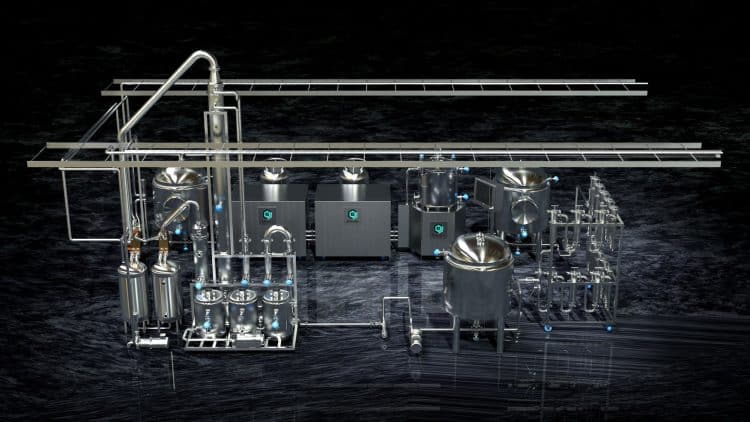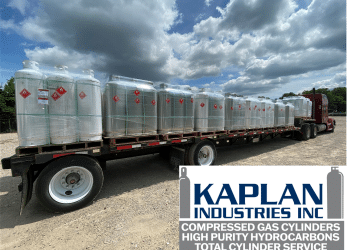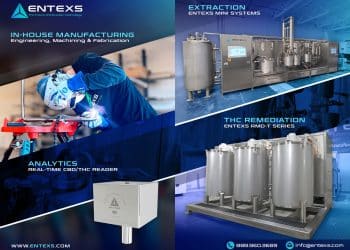Niche markets enable artisanal extracts. Small-scale extraction dominates in Oregon, Washington, and Colorado, but California plays a different game: economies of scale. Taxation and rigorous batch testing requirements have pressed manufacturers to the wall.
“The only players that will be able to survive are the ones who can produce a large amount of extract,” said Bryan Hull, CEO and founding engineer of EthoEx. “California is different from the other states… it’s made for a high-throughput market.”
It’s no coincidence that Hull’s EthoEx equipment is capable of converting 20,000 pounds of biomass to full spectrum oil in a mere 8 hours. Hull spent five years developing and vending CO2 extraction machines in California. Then he discovered ethanol and fell in love. “I was doing 10 to 20 pounds in 8 hours with CO2, but some of the people in the lab were doing 20 pounds in around 20 minutes with ethanol.”
Hull recognized the yield advantage and formed a team to build the patented EthoEx Prime. “We’re all just engineers at heart with a wide variety of backgrounds, from chemical engineering to medical device to aerospace.”
The EthoEx Prime delivers closed-loop, full process ethanol extraction. The system is completely automated, balanced, and maintained for the target spec of 1,000 pounds per 8-hour shift. Components include ethanol storage, electrical and cryogenic chilling units, a batch reactor, filtration, and ethanol recovery. The Prime is a proof of concept for the EthoEx Industrial, which is capable of 20,000 pounds per 8-hour shift.
Several feats of innovative engineering push EthoEx to the cutting edge.
Ethanol extractors know that lowering the temperature of ethanol to around -40°C reduces contamination from chlorophyll, fats, and lipids. But this temperature left Hull unsatisfied. “Standard methodology for ethanol extract is room-based temperature down to -40°C where you can get reasonable quality crude oil,” said Hull. “Even at -40°C filtration, this crude extract requires high filtration and fractional distillation, making full spectrum elusive and difficult to obtain.”
“My sweet spot is anywhere from -60°C to -90°C depending on extraction time, which is very difficult to do,” Hull continued. “What’s really novel about this very low temperature range is that you can obtain full spectrum. All the unwanted constituents are completely left behind in the biomass.”
To maintain such low temperatures, the EthoEx engineering team developed a fully vacuum-insulated batch reactor. With ethanol, temperature control is critical. They also added a loop that re-circulates the ethanol. This returns and maintains the ethanol to the target temperature set point throughout the extraction.
The recirculation serves a second purpose: it continuously flushes the biomass with the super-chilled ethanol solvent. While higher temperatures increase solvent effectiveness, lower temperatures reduce solvent effectiveness. Increased ethanol re-circulation counters the loss of efficiency from the lower temperature.
Beyond the batch reactor, the extract moves to filtration (mostly particulate). Then, it reaches the next novel aspect of the EthoEx system: the custom vacuum falling-film evaporator.
Evaporation/recovery of ethanol requires a high temperature, typically 173° F (78° C) and standard atmospheric pressure. But critical terpene profiles volatize at much lower temperatures, such as 70° F (21° C). “You burn off a lot of those higher keynotes that are desired,” explained Hull. “If water soluble terpenes were extracted, we want to capture them during our recovery process.”
The EthoEx falling-film evaporator was designed to withstand a deep vacuum. At ½ to 1 torr, the tincture atomizes and ethanol can be recovered at temperatures of 100-105° F (37-40° C). This preserves full spectrum terpenes and cannabinoids while maximizing throughput. “We’re currently pushing 150 gallons an hour out of our Prime falling-film evaporator, which far exceeds most competitors out there for the same price point,” Hull said.
Following evaporation, recovered ethanol pumps back to the starting point for re-chilling. The process repeats. From start to finish, it requires only one operator to load and unload the batch reactor. The EthoEx Industrial scales the Prime to greater heights and replaces the batch reactor with a continuous feed system.
The Prime requires 19 kilowatt swings of electricity to recover ethanol and draw the temperature down to -40°C. Another 12 kilowatts of liquid-nitrogen chemical energy push the temperature into the -80°C range. The equipment meets all California code requirements; it is fully certifiable and third-party reviewed by the California Cannabis Hemp Engineering Alliance, acceptable for Class 1 Division 2 hazardous areas and Class 2 European Union standards.
CO2 extraction is touted for its low environmental impact, but Hull sees ethanol as more sustainable. “It’s not just the environmental impact, but the safety,” he pointed out. “CO2 equipment is pricey because it takes a lot of engineering design and material to make them safe. It can be difficult and expensive to scale CO2. To process 1,000 pounds in the same amount of time with CO2, you would require exponentially more floor area and start-up costs.”
Hydrocarbon extraction, on the other hand, is efficient. But hydrocarbon solvents are highly combustible and toxic to human health, and thus expensive to implement in a legal market. To borrow an analogy from the Goldilocks fairy tale, ethanol represents for many extractors a ‘not too hot, not too cold, but just right’ solvent of choice for mass throughput. The EthoEx system minimizes waste with recirculation/recovery and leaves no residual solvent in the end product.
Hull and the EthoEx engineering team drew inspiration from the oil and gas industry. Their patented technology has spawned prototypes that address issues across the wider cannabis refinement space. For example, they are currently developing industrial-sized fractional and steam distillation sets. Another upcoming technology that excites Hull is mobile, on-site extraction, which he sees as a “farm-to-fork methodology.”
“Because it’s such a tight package, our process can literally fit on an F-750. It’s a full spectrum process right there at the site,” said Hull. “The cultivator and the manufacture can shake hands, put product in, and get oil out of it at the end of the day.” Unlike most other mobile extraction operations, EthoEx produces ready-for-market full spectrum oil without the need for additional filtration and refinement.
The EthoEx team also includes software and data engineers; they created Cloud-based software that tracks 63 data points per millisecond during extraction. Relevant analytics include temperature, pressure, and weight, from which the user can create plots, calculate yields, and watch extraction unfold in real time. This offers transparency for the extractor and their customer.
Hull acknowledges that he stands on the shoulders of “garage scientists” who advanced extraction independently for personal joy. EthoEx aims to tap into the needs of an exploding industry with innovations that afford mass production. “It’s a good time to be an engineer and be able to design for this target industry. It’s very rare. It’s a once-in-a-lifetime opportunity,” Hull confessed.
EthoEx aims to launch its revolutionary equipment by year’s end. Bryan Hull, CEO and founding engineer, believes California is only the beginning. “We’ll be well-situated to be a worldwide company.”












